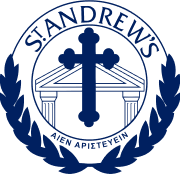In the Primary Years (Pre-Kindergarten to Year 6), your child will develop a desire to explore, broaden their thinking and build strong foundations in the core Learning Areas. Our supportive, inclusive environment ensures each child is understood and valued as an individual. Our innovative educators spark students’ curiosity, awe and wonder, inspiring a real love of learning that will be instilled and continued long into the future.
Educational programs are engaging and challenging, with a focus on meeting individualised learning needs. Students remain with their class teacher for the core learning areas of English, Mathematics, Science and Humanities and Social Sciences. Class teachers also focus on the wellbeing of your child, ensuring that their safety, social and emotional needs are met, checking in regularly. Our specialist teachers take their classes in dedicated facilities for Art, Music, Physical Education, Library and Modern Greek Studies. Religion is also a compulsory subject in the Primary Years.
Understanding Your Child’s Progress
At the end of Term 1, as we’ve gotten to know your child, you will be invited to attend a Parent-Student-Teacher interview where we will set goals for the remainder of the year. At the end of Term 2, you will receive a Semester Report and Student Portfolio.
To speak directly to your child’s educator on their progress to date, St. Andrew’s Grammar will host a Learning Journey event and/or Parent-Student-Teacher Interview towards the end of Term 3. Lastly, you will also receive a Final Report and Student Portfolio at the end of Term 4. Curriculum Learning through hands-on activities and encouraging students to ask ‘why’, forms the basis of how the curriculum is enacted in our Early Years programs.
Students remain with their class teacher for the core Learning Areas of English, Mathematics, Science and Humanities and Social Sciences, with specialist teachers for Physical Education, Music, Modern Greek Studies and Religion.
Curriculum
Learning through hands-on activities and encouraging students to ask ‘why’, forms the basis of how the curriculum is enacted in our Early Years programs. Students remain with their class teacher for the core learning areas of English, Mathematics, Science and Humanities and Social Sciences, with specialist teachers for Physical Education, Music, Modern Greek Studies and Religion.
Perceptual Motor Programme
To improve gross motor skills through physical activity, Pre-Kindergarten, Kindergarten and Pre-Primary students engage in a Perceptual Motor Program each week. This movement-based approach will support and guide your child, improving their hand-to-eye and foot-to-eye coordination, general fitness, balance and eye-tracking skills. The activities, usually conducted outdoors, involve a range of exercises such as climbing, balancing, throwing and catching, running, skipping, creative movement and dance.
Music
St. Andrew’s Grammar has a creative music program inspired by the Kodály Method and philosophy: everyone has the ability to participate in and enjoy music. Weekly lessons are centred around your child and skills are taught in a logical, sequential manner through singing, games and dances. Instruments are used to enhance the experience.
Modern Greek Studies
Maintaining our Hellenic heritage and building in students an understanding of global citizenship is important across their educational journey at St. Andrew’s Grammar. From Kindergarten onwards, your child will engage in age-appropriate cultural experiences. In the Early Years, they learn about Greek language and culture through play, songs, arts and crafts, dance and literary experiences. Students are encouraged to take an active role in learning Greek language by giving them many opportunities to speak and listen.
Religion
As a Greek Orthodox School, Kindergarten and Pre-Primary students are introduced to Religion through hands-on experiences, interacting with a variety of written and visual texts such as songs, big books and interactive resources. Play and games are also used to support students dynamic learning in Religion.
To learn how students take their Early Years learning into Year 1 and beyond, click here.

